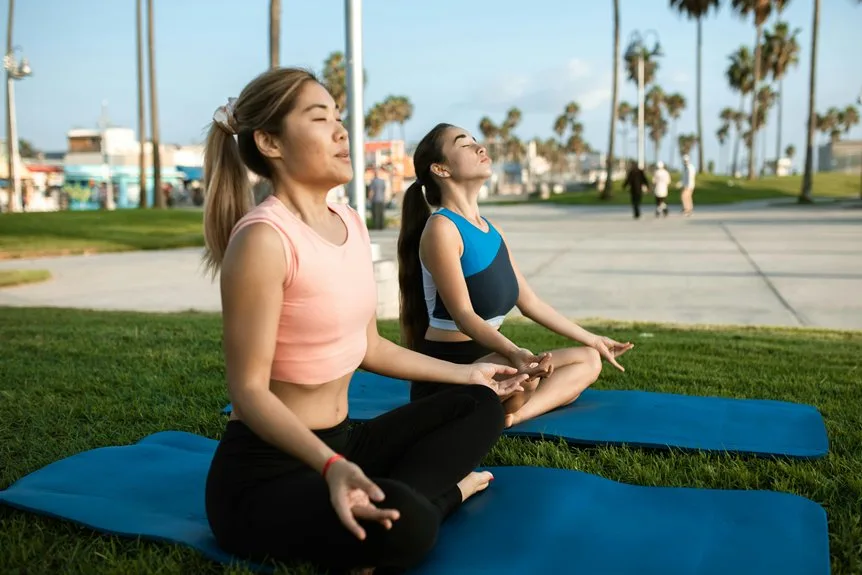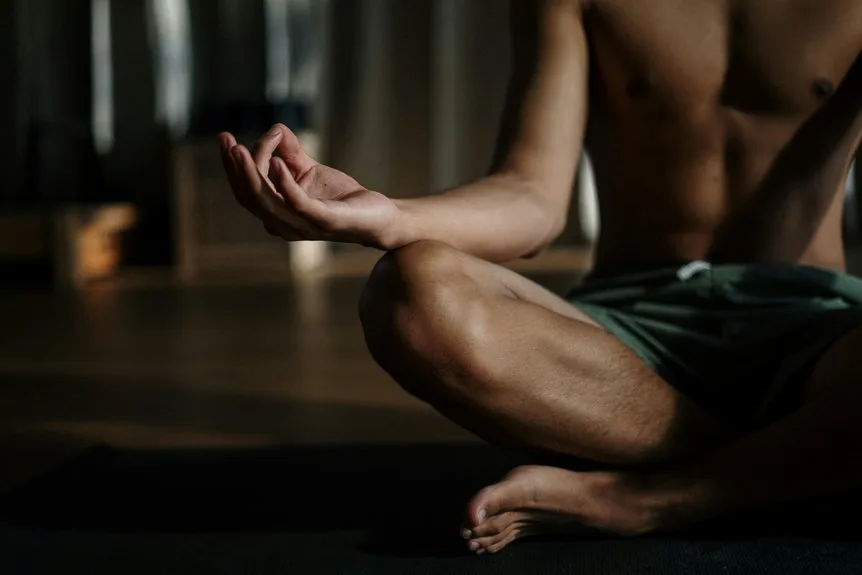Life can feel like a juggling act, with stress often sneaking in when least expected. Self-care isn’t just about bubble baths or spa days; it’s a practical tool for keeping stress in check and emotions balanced. By prioritizing simple routines, anyone can build resilience and protect their well-being, even on the busiest days. But what exactly makes self-care so powerful in managing stress, and how can it fit into an already packed schedule?
Understanding the Role of Self-Care in Stress Management
Why does self-care matter so much when it comes to handling stress? Self-care isn’t just bubble baths and spa days—it’s a real tool for stress management.
Research suggests that self-care routines help regulate cortisol, the “stress hormone,” protecting the body from its negative effects. Simple acts like mindfulness or deep breathing can enhance emotional resilience, helping people bounce back from rough days.
When self-care is made a habit, individuals gain mental clarity and emotional stability, making it easier to face daily challenges. Embracing self-care, then, is like giving yourself a team of cheerleaders for life’s tough moments. For those looking to enhance their self-care practices, retreat centers like Cuyama Buckhorn offer a serene environment with amenities like a pool, jacuzzi, and outdoor fire pits to unwind.
Key Benefits of Self-Care for Mental and Physical Health
A handful of simple self-care habits can make a world of difference for both mind and body. Regular self-care routines help ease stress, lowering anxiety and depression, which enhances overall mental health. People often notice a real jump in self-confidence—up to 64%—and happiness, too. Physically, self-care supports a stronger immune system, so the risk of chronic illnesses like heart disease drops. It also balances stress hormones, leading to better emotional stability and higher productivity. Together, these benefits show that making time for self-care isn’t just a luxury; it’s a straightforward path toward lasting stress relief and well-being. Incorporating holistic spa rituals at places like Spa Talisa in the Four Seasons Resort and Residences Napa Valley can further enhance self-care by providing personalized treatments that promote relaxation and rejuvenation.
How Self-Care Practices Build Resilience
When life throws curveballs, self-care practices can act like a sturdy shield, helping people bounce back instead of breaking down. Regular self-care—like staying active, eating well, and getting enough sleep—gives the body and mind the support needed to handle stress more easily. By making time for self-care, individuals build resilience, gaining the strength to face challenges head-on. It’s not just about avoiding rough days; it’s about learning to recover more quickly and adapt with confidence. Consistent self-care routines offer a sense of control, helping everyone feel more connected, supported, and ready for whatever life brings next. For those seeking a personalized approach to wellness, Sensei Porcupine Creek offers a retreat that focuses on individualized wellbeing journeys guided by trained professionals.
Simple Self-Care Habits to Start Today
Starting with a few easy habits can make self-care feel less like a chore and more like a treat. Morning mindfulness practices set a calm tone for the day. Nourishing movement choices like a quick walk or some stretches keep energy up. Evening wind-down rituals help the mind and body settle in for restful sleep. Visiting places like the Quiet Mind Mountain Lodge can enhance these self-care routines with their focus on relaxation and inner peace. With just a little time and consistency, these routines can quickly become a comforting part of daily life.
Morning Mindfulness Practices
Mornings set the tone for the entire day, so weaving a bit of mindfulness into those first few minutes can make a surprising difference. Morning mindfulness practices—like deep breathing, meditation, or jotting down a few grateful thoughts—help lower stress right from the start.
Even just five minutes can enhance mental clarity, lift mood, and create a sense of calm before life’s rush begins. As part of self-care routines, these habits help people feel more connected and ready to face challenges together.
Over time, morning mindfulness increases resilience, builds emotional stability, and supports stress relief that lasts beyond breakfast.
Nourishing Movement Choices
Although self-care often conjures images of bubble baths or face masks, nourishing movement is one of the most effective—and overlooked—ways to relieve stress.
Even a short walk around the block or gentle desk stretches can spark a wave of endorphins, those feel-good chemicals that naturally lower stress levels.
Making movement a daily self-care habit, whether it’s dancing in your living room or tending to a garden, helps keep stress at bay and builds a sense of belonging with others who value wellness.
Regular activity not only supports mental clarity but also keeps energy high, making stress relief feel achievable and enjoyable.
Evening Wind-Down Rituals
A well-chosen evening wind-down ritual can change the end of the day from a rush of worries into a gentle glide toward relaxation. Building an evening routine, even with something simple like reading or stretching, can help lower stress and enhance sleep quality.
Swapping out screens for calming music or dim lights signals to the mind and body that it’s time to let go. Aromatherapy, like lavender, can make the environment feel extra cozy.
When these habits become routine, they strengthen emotional resilience, helping everyone feel more grounded and ready to face tomorrow with a better night’s rest behind them.
The Impact of Self-Care on Caregiving Abilities
When it comes to caring for others, self-care often gets pushed to the bottom of the to-do list, yet its impact on caregiving abilities is hard to ignore. By making self-care a regular part of life, caregivers can build emotional resilience, making it easier to handle tough days and find stress relief.
Simple routines—like taking a walk or reading quietly—help prevent burnout, sharpen mental clarity, and support good decision-making. Studies even show that caregivers who prioritize self-care feel less anxious and more capable.
In a community, caring for oneself isn’t selfish—it’s a way to keep giving to others.
Supporting Physical Health Through Self-Care
Caring for others can take a toll on both mind and body, so it only makes sense to look at how self-care supports physical health as well. Self-care routines like daily walks or cycling can spark endorphins, giving a natural uplift and helping with stress reduction.
Choosing colorful meals—think bright fruits and hearty whole grains—keeps immune systems running strong and stress symptoms at bay. Committing to restful sleep, about 7–9 hours nightly, helps bodies refresh and regulate stress hormones.
Relaxation, whether through yoga or a gentle massage, lowers blood pressure and muscle tension, making physical health a shared community goal.
Enhancing Emotional Well-Being With Self-Care Activities
Even on the busiest days, setting aside a few moments for self-care can make a world of difference in how emotions are experienced and managed.
Simple self-care activities, like journaling or practicing mindfulness, help people recognize and regulate their feelings, which enhances emotional well-being. These habits act as stress relief, lowering stress hormone levels and building resilience against life’s challenges.
Positive self-talk, forgiveness, and compassion toward oneself can lift self-esteem and ease emotional distress.
When self-care routines become part of daily life, individuals often find greater satisfaction and stability, making it easier to face ups and downs together as a community.
Strengthening Social Connections as a Form of Self-Care
Strengthening social connections is a powerful way to care for oneself, especially when it comes to building supportive relationships that make tough days feel a little lighter. Sharing stories or laughs with friends and family not only enhances emotional resilience but also helps people bounce back from stress more quickly.
Building Supportive Relationships
Why do some moments feel lighter when shared with others? It’s often because building supportive relationships serves as a powerful form of self-care. Strong social connections can cut the risk of early death in half, proving they’re more than just pleasant—they’re essential.
When people reach out to trusted friends or family, they create a buffer against stress, lowering cortisol and adding a real sense of safety. Social support doesn’t just soothe rough days; it also encourages belonging and community.
Enhancing Emotional Resilience
A key part of building emotional resilience often starts with the simple act of reaching out to others. When people make social connections a regular part of their self-care practices—like calling a friend or joining a group—they can see real changes in their mood and stress levels.
These interactions help lower feelings of loneliness and can actually reduce the body’s cortisol response to stress. Connecting with others, sharing experiences, and leaning on support networks lets individuals feel seen and understood, which enhances emotional resilience and makes it easier to handle life’s ups and downs with greater confidence.
Fostering Community Belonging
In today’s fast-paced world, finding a sense of community can be both comforting and energizing. When people connect with others, they often notice a drop in stress—sometimes by as much as half. Strong relationships act like a shield, buffering against life’s emotional ups and downs.
Joining community groups or support networks not only sparks belonging but also helps fight off anxiety and depression. Social interaction lights up brain areas linked to joy and safety, building resilience.
Sharing experiences and coping strategies within a community makes everyone stronger, creating a supportive environment where belonging and well-being naturally thrive.
Setting Healthy Boundaries to Reduce Stress
Ever wondered how some people manage to stay calm, even when life seems chaotic? Their secret often lies in setting healthy boundaries. By drawing clear lines, they protect their mental health and keep stress in check.
Boundaries stop emotional exhaustion before it starts and help maintain strong connections with others. Here’s how boundaries make a difference:
- Reduce stress by limiting overwhelming demands
- Improve mental health through self-respect
- Increase resilience in tough situations
- Cultivate better communication and fewer conflicts
- Allow intentional time management and prevent burnout
When boundaries are clear, life feels more manageable, and belonging comes naturally.
Effective Stress Relief Strategies to Incorporate
When it comes to keeping stress in check, a mix of mindfulness, simple relaxation routines, and smart lifestyle choices can make a real difference.
Practicing things like deep breathing or yoga, sticking to healthy habits, and knowing when to say no all help create a sense of calm in daily life.
Mindfulness and Relaxation Practices
A busy mind can feel like a noisy room, but mindfulness and relaxation practices offer a welcome escape from the chaos. Embracing these approaches can make stress reduction feel more like a shared voyage than a solo battle.
Mindfulness helps quiet racing thoughts, while relaxation techniques calm the body and mind. Consider trying these stress-busting methods:
- Practice mindfulness meditation to enhance focus and emotional balance.
- Use progressive muscle relaxation for instant physical ease.
- Try guided imagery—imagine peaceful scenes for mental relief.
- Engage in breathing exercises to trigger instant calm.
- Stick with these habits for better sleep and overall well-being.
Healthy Lifestyle Habits
Healthy lifestyle habits can become powerful allies in the daily fight against stress. Simple changes like going for a brisk walk, cycling with friends, or choosing colorful veggies at meals help the body release endorphins, those feel-good chemicals that naturally elevate mood and stress relief.
Prioritizing quality sleep—about 7 to 9 hours—recharges energy and builds mental resilience for tomorrow’s challenges. Swapping sugary snacks for whole grains or cutting back on caffeine and alcohol can also make a big difference.
Even a few minutes of deep breathing or yoga can clear the mind, making it easier to feel connected and supported.
Setting Personal Boundaries
Plenty of people struggle with feeling stretched too thin, but setting personal boundaries can be a turning point for stress relief. Boundaries act as a shield for both time and energy, promoting better self-care and stress management.
When someone clearly communicates limits, it not only supports mental health but also improves relationships with friends, family, and coworkers. Research suggests that boundary-setting leads to less anxiety and emotional overload.
For those seeking a sense of belonging and balance, consider these key benefits:
- Prevents overcommitment
- Protects personal time
- Fosters mutual respect
- Enhances resilience
- Encourages prioritized self-care
Overcoming Barriers to Self-Care When Feeling Overwhelmed
Even though self-care is often praised as the answer to modern stress, actually making it a priority can feel nearly impossible when life gets overwhelming. People may skip self-care, thinking there’s no time or feeling guilty for putting themselves first.
Overcoming barriers like fatigue and emotional exhaustion can seem tough, but small steps—like a short walk or a deep breath—can kickstart stress relief. Many also struggle with a lack of support or understanding.
Reframing self-care as essential rather than optional helps. Setting boundaries and reaching out to friends or groups can make self-care feel more natural, even when overwhelmed.
Personalizing Self-Care Routines for Lasting Results
While self-care routines are often presented as one-size-fits-all, the truth is that stress relief looks different for everyone. Personalizing self-care routines can make all the difference when it comes to lasting results.
By tuning activities to fit unique preferences and situations, people are more likely to stick with them and see real benefits. A personalized approach makes stress relief more meaningful and effective.
Here’s what helps:
- Choosing activities that spark genuine joy
- Adjusting routines to fit changing life demands
- Recognizing and honoring personal stress triggers
- Building flexibility for when life gets unpredictable
- Cultivating empowerment through ownership
Taking the First Step Toward a Healthier, Balanced Life
Finding the right self-care routine can feel like searching for a favorite song in a giant playlist—there’s a lot to choose from, but the real magic happens when the perfect track is found.
Taking the first step toward a healthier, balanced life often starts with one small, manageable act each day. This simple commitment to self-care can reduce stress relief by up to 30% over time.
By choosing routines that fit personal preferences, it becomes easier to stick with them, preventing burnout and enhancing well-being.
Each step builds momentum, making a balanced life feel more like a shared odyssey.
Frequently Asked Questions
Why Is Self-Care Important in Stress Management?
Self-care is important in stress management because meditation benefits, relaxation techniques, and emotional resilience help promote a sense of community support. These practices encourage individuals to connect, manage stress effectively, and build healthier relationships within their social circles.
Why Is It Important to Prioritize Self-Care?
Echoing ancient wisdom, prioritizing self-care through mindfulness practices and establishing healthy boundaries cultivates emotional resilience. Such intentional actions nurture a sense of connectedness, enabling individuals to thrive together, balancing personal well-being with communal harmony and shared fulfillment.
How Do You Prioritize Self-Care to Manage Stress?
To prioritize self-care for managing stress, one schedules time intentionally, integrates mindfulness practices, and maintains emotional awareness. This approach cultivates a sense of connection and support, encouraging individuals to value their well-being while promoting a healthier, more inclusive community.
Why Is It Important to Take Care of Ourselves Physically in Order to Reduce Stress?
Engaging in physical activity, practicing sleep hygiene, and nurturing the mind body connection each cultivate resilience, promote emotional balance, and build community. Together, these habits help individuals manage stress and support a sense of belonging and well-being.
Final Thoughts
Prioritizing self-care routines isn’t just a nice idea—it’s backed by research. In fact, studies show that people who practice regular self-care are 65% less likely to experience high stress levels. By making small changes, like taking mindful breaks or setting boundaries, anyone can enhance their mood and resilience. So, even when life feels overwhelming, remember that self-care isn’t selfish. It’s a smart, science-backed way to keep both your mind and body in balance.







